Professor Shuh-Ji Kao: A Pioneering Academic Leader in Nitrogen Cycling
1986年,再战高考的高树基入学台湾大学海洋系,开始了他长达三十七年的科研耐力跑。
After taking the college entrance exam twice, Shuh-Ji Kao enrolled in the Department of Oceanography at National Taiwan University in 1986, embarking on his 37-year-long journey in scientific research.
2020年,在海洋氮循环领域已享有盛誉的高树基低调来琼,上任南海海洋资源利用国家重点实验室(下文简称南海国重)主任一职。
In 2020, Kao, who had already gained a prestigious academic reputation in the field of marine nitrogen cycle, came to Hainan and became the director of State Key Laboratory of Marine Resources Utilization in South China Sea (MRU).
2021年1月,入职南海国重后的高树基在个人社交平台上写下:“期待自己成为海南大学年轻科研工作者和学生的大伞。”这句话既勉励自己,也鼓舞后人。
“I hope to contribute to the success of young researchers and students in MRU and help them achieve their goals.” This is what he wrote on his social media platform after joining Hainan University in January 2021, which can encourage himself as well as future generations.
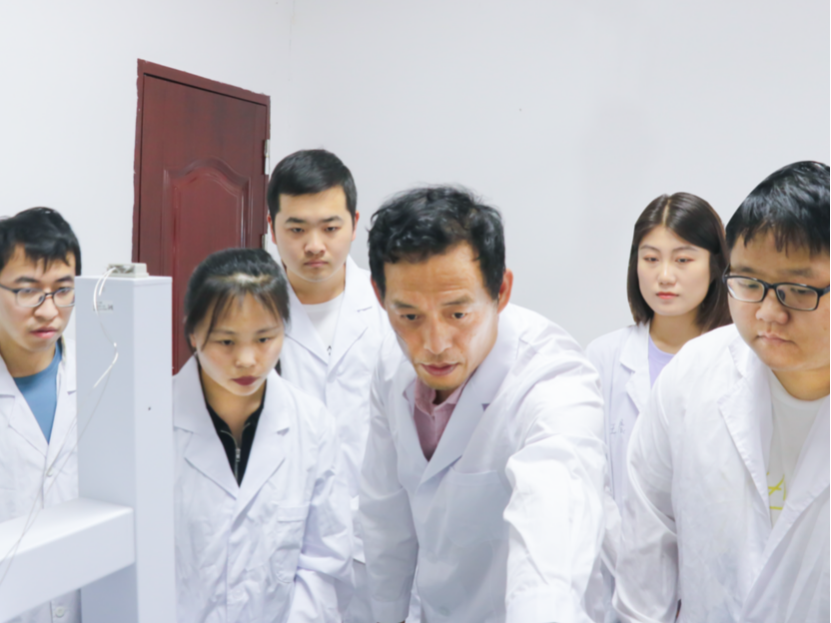
高树基给学生示范仪器操作。
Shu-Ji Kao was demonstrating the operation of the instrument to the students.
“持之以恒”的科研工作者
A Persistent Researcher
时间拨回1986年。那年台湾刚刚解除实施了三十七年的“戒严令”。彼时在军校读了两年书的高树基决定退学,再次报考大学联招考试。
Let's turn back the clock to 1986 when Taiwan had just lifted its 37-year-long martial law. At that time, after studying for two years at a military academy, Kao decided to drop out and take the university entrance exam again.
“当时我的高考成绩只能上台湾大学的海洋系。我当时根本不知道海洋系学啥,将来毕业能干啥。”高树基回忆道,“但是后来我走的路,发展到了现在,连我自己也没法想得到。”
“After the entrance exam, my test score was only good enough to enable me to get into the oceanography department at Taiwan University, and I had no idea what it was and what I could do after graduation.” Kao recalled, “But what surprises me is that I have been walking down this path till now.”
2001年12月,时年34岁的高树基进入台湾“中央研究院”,从此事业进入快车道。
In December 2001, 34-year-old Kao joined Academia Sinica, and his research career entered a fast rising period.
四年副高、四年正高,TAO (Terrestrial, Atmospheric and Oceanic Sciences) 最佳文章奖、台湾年轻学者研究著作奖等国内外奖项纷至沓来。
He has only spent four years to be promoted as an associate professor and another four years as a full professor. Numerous awards have been bestowed upon him, including the Best Article Award of the TAO (Terrestrial, Atmospheric and Oceanic Sciences) and the Taiwan Young Scholar Research Work Award.
然而在金子发光之前,高树基也有数段灰暗时刻。
However, Kao also encountered many plights and struggles before the glory days.
博二因是否休学的问题,父母争执不休;第一份事业单位的研究员工作因政策变动,原定的副高职称突然降级为中级;在事业单位工作一年多后,为了回归学术圈,重新以博士后职位进入台湾海洋科学研究中心工作……
In the second year of his doctor’s study, he often quarreled with parents for temporary absence from university. When he was doing his first job as a research staff member in a public institution, his professional title was downgraded from associate professor to lecturer due to some policies. Over one year later, he returned to the academic field as a postdoctoral fellow and worked at the Institute of Oceanography in Taiwan.
科研路上辗转腾挪,高树基只把当时的心境寥寥总结为:“我从没有特别要求,就算从最基础的干起也没问题。”
“I never ask for anything. I’m cool with starting from the very bottom.” Kao said.
作为国内碳、氮生物地球化学循环领域的领军人物,相关系统性理论构建源于高树基扎实的科研经历。
Kao’s scientific research has made leading contributions to the field of carbon and nitrogen biogeochemical cycles in China, and the related systematic theory that Kao constructed owes to his solid research experience.
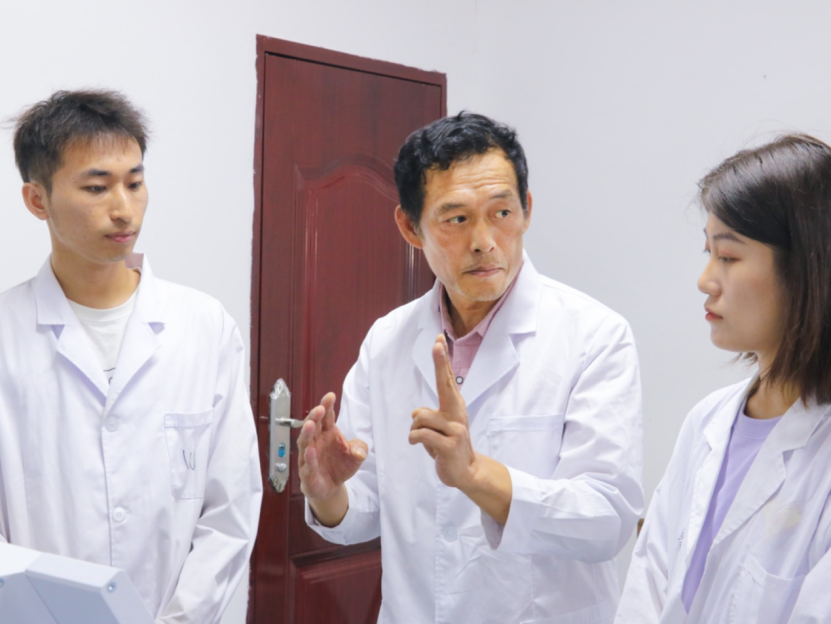
高树基给学生答疑。
Shu-Ji Kao was answering questions for students.
“我虽然一直在海洋科学上钻研,但我的研究方向并非一成不变。一开始我是研究陆地水体的,然后又去研究古环境,现在又跨进了氮循环的复杂过程。这么看下来,我的研究方向是越来越细化了的。”高树基介绍道。
“Although I have been devoting myself to marine science, my research interest is not static. First I studied terrestrial waters, then paleoenvironments, and now the complex process of nitrogen cycle. Overall, my research orientation is becoming increasingly specific.” Kao said.
研究范围从大气、流域、河口、边缘海再到开放大洋,高树基对于水体、颗粒物、海-气、沉积物-水界面的氮过程及氮-碳耦合过程形成了独到见解。
Kao has formed unique insights on nitrogen processes and nitrogen-carbon coupling processes in water bodies, particulate matter, air-sea, and sediment-water interfaces, with research scopes being the atmosphere, watersheds, estuaries, marginal seas and open ocean.
“循循善诱”的教育工作者
A Gentle Educator
苦尽甘来的高树基经常会鞭策师生求学、求知不如求教。
Kao often urges his students to seek knowledge by asking questions rather than just studying passively
在谈及师生关系时,高树基无奈地挠头道:“唉,我的学生嘴上都说不怕我,但却很少来找我。”
“My students say they're not afraid of me, but they rarely come to me for help” Kao helplessly said when talking about the relationships with his students.
他认为,教书育人就像带孩子,要精细化喂养。每一个学生都要因材施教,学生积极的求,老师才会积极的教,这样才能教学相长、突破极限、不断创新。
He believes an educator is equal to a parent who should provide attentive care. Education must follow the principle of teaching students in accordance with their aptitude. Students should actively seek instructions and teachers will be glad to engage in providing them, leading to a mutually beneficial dynamic that promotes breakthroughs and constant innovation.
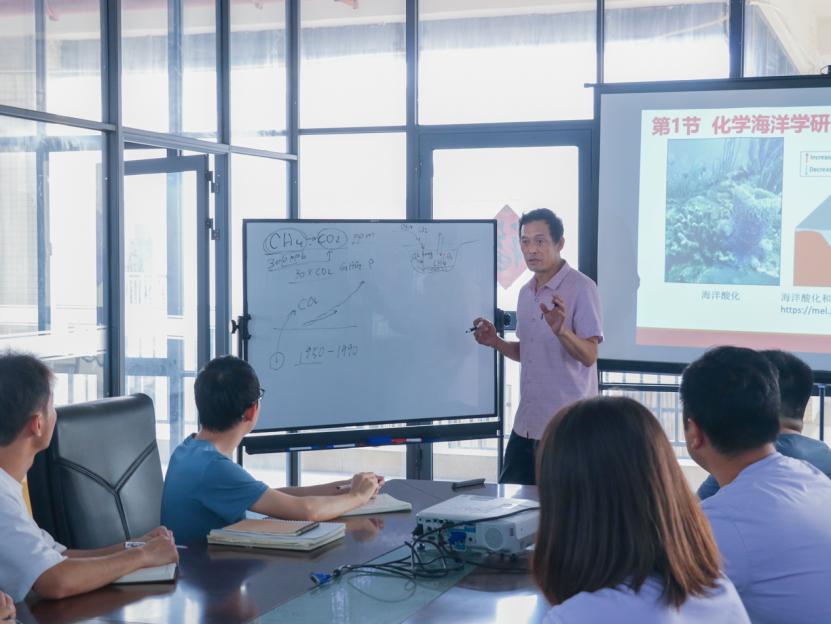
高树基与学生做知识分享。
Shu-Ji Kao was giving a lecture to students.
“关于地下水的储存与污染问题,你可以用花钱和挣钱来理解。地下水的储存量就像你口袋里的一百块钱,抽地下水就是花钱,降雨入渗就是挣钱。如果只花不挣,那地下水不就没了?这也是大三角洲城市下沉的主因。”高树基以打比方的方式在与同学做分享。
“When it comes to the storage and pollution of underground water, you can think of them in terms of spending and earning money. The amount of stored underground water is like having 100 yuan in your pocket. Pumping out underground water is like spending money, while rainwater infiltration is like earning money. If you only spend without earning, then the groundwater will peter out, which is the main reason for the subsidence of cities in the delta region.” Kao said.
“在通过降雨来补充地下水的过程中,农业土壤里面的有机质或畜牧废弃物就会随之渗入地下水中。然而这不仅会产生高浓度的氨氮威胁饮用水安全,还会在补充地下水水位的过程中产生硝与亚硝等致癌物质和温室气体。如何解决这个问题就可以是下一个研究方向了。”
“ In the process of replenishing groundwater through rainfall, the organic matter in agricultural soil or livestock waste will seep into the groundwater. Unfortunately, this not only produces a high concentration of ammonia nitrogen that threatens drinking water safety, but also creates carcinogenic substances like nitrites and nitrates, as well as greenhouse gases.How to figure out this problem could be the next area of research.”
高树基在用幽默风趣的语言讲解他最近以通讯作者为身份发表于顶级期刊Water Research(影响因子为13.4)中的科研成果。
Kao uses witty words to explain his recent research findings published in the top journal Water Research (IF=13.400).
海洋科学作为一门具有交叉属性的基础科学,不可避免出现专业名词多、知识面广等情况,如何才能把晦涩的专业问题说得清、道得明呢?
As a fundamental interdisciplinary science, oceanography inevitably involves numerous terms and a wide range of knowledge. How can we teach complex and professional knowledge clearly?
针对这一教学痛点,高树基有他自己的授课心得。他认为,教学就跟拍视频一样,超过五分钟的内容观众就容易困。要想集中观众注意力,就得时时强化刺激。也就是在观察学生神情反应中,用学生能听得懂的话语把对方可能不懂的问题说明白。
In response to this teaching challenge, Kao has his own methods. He believes that teaching is like shooting a video. If the content exceeds five minutes, the audience will easily get bored. To capture the audience’s attention and focus, it is necessary for teachers to constantly reinforce stimulation to them. That means teacher should observe students' emotional reactions and use words that students can understand to clarify problems.
正是高树基这种不故作高深、对学生接受情况体察细微的授课方式,吸引了南海国重内一众“迷弟迷妹”。
With meticulous attention to details and comfortable teaching method, he has attracted a throng of admirers in MRU.
最近,高树基在团队内部开设的《同位素应用》分享课上,年轻师生们听课热情高涨,座无虚席。
Recently, at a sharing session on “Isotope Applications” that Kao opened within his research team, the young teachers and students were enthusiastic, and there was not an empty seat in the house.
没有位置坐的师生就插空站着,没法站着听的师生就只好在隔壁办公室收看网络直播。
Those who couldn't find a seat stood in the corridors or watch the live broadcast in the adjacent office.
这次原定是一小时的分享课,但在师生们的热情提问下延长至两小时。
As scheduled, it was a one-hour sharing session, but extended to two hours due to a lot of questions from teachers and students.
“奖掖后学”的科研引路人
A Generous Pioneer
十年树木,百年树人。“海洋科学这门专业真不好学,真不是说培养个四五年就能出人才的。这学生至少得培养个十年才能说是入了门的。”高树基认真地说道。
“Oceanography is truly difficult to master, and talents can hardly be produced after accepting education for just several years. Ten years of cultivation is required for students to truly grasp the fundamentals,” stated Kao gravely.
据统计,2018年海洋经济生产总值占国内生产总值的9.3%,共提供了3684万个工作岗位,但从事海洋科学和海洋技术相关领域的专门人才仅约10万~20万人。目前复合型海洋技术人才总量不足的问题正在制约我国海洋科技发展。
According to statistics, in 2018, gross marine economic production accounted for 9.3% of the total domestic production value, providing a total of 36.84 million job opportunities. However, the number of specialists engaged in marine science and technology fields is only around 100,000 to 200,000 people. The current shortage of interdisciplinary specialists is a limitation for marine scientific and technological development in China.
对于海洋科学的人才与市场供需失衡的问题,高树基有自己的见解:“我的大半生都投身于科研当中,自然深深地了解研究工作的苦与甘。要培养一位优秀的科研人才,需要方方面面的条件,奖掖后进更重要。”
In terms of the imbalance between talents supply and demand, Kao has his own views, “Throughout most of my life, I have been dedicated to scientific research and have a deep understanding of its sorrows and joys. To cultivate excellent scientific and technological talents need various conditions, and it is more important to nurture younger generation.”
属于热带季风气候的海南与高树基的出生地台湾乃是一衣带水。
Hainan has a tropical monsoon climate, which is very similar to that in his birthplace of Taiwan.
2020年10月,高树基婉拒国内其他大学和研究所开出的更好条件,转而接受南海国重兼职主任的人事任命,踏上了深耕南海的开疆拓土之路。
In October 2020, Kao declined offers from other domestic universities and research institutes which offer better conditions, and accepted the appointment as director of MRU, embarking on a new journey of studying the South China Sea.
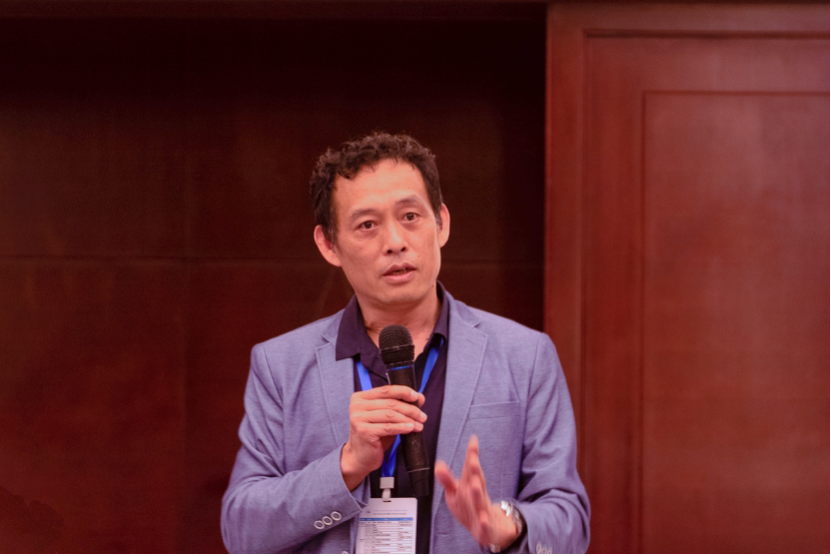
高树基作参会发言
Shu-Ji Kao was speaking at a meeting
次年开春,他在个人社交平台上发文描述了他当时的想法:“国内拔尖的老师和学生太多太多,无需再锦上添花。在我的眼里海南是块璞玉,有底蕴、有潜力,值得投注精神心力。在年过半百的人生下半场,我顺性选择了海南大学来拓展科研平台,期待自己成为海南大学年轻科研工作者以及学生的大伞。”
In the spring of 2021, he described his thoughts on his personal social media platform: To me, Hainan is a precious jade with great potentials, which is worth investing in. In the second half of my life, I follow my heart and choose Hainan University to further my research. I hope to contribute to the success of young researchers and students in MRU and help them achieve their goals.
“好玩敏思”的生活艺术家
A Versatile Artist
高树基的爱好十分丰富,羽毛球、排球、游泳、潜水等运动项目无一不通。
Kao excels in various sports including badminton, volleyball, swimming and diving.
在南海国重308室进行采访时,高树基指着办公室一角的海钓渔具和羽毛球拍说道:“我喜欢钓鱼和打羽毛球,因为我们科研人对工作没有什么时间概念,从周一到周日、从早上七点到晚上十二点,我都在这里,所以工作累了就可以随时出发去放松。”
During the interview, Kao pointed to the fishing gear and badminton rackets at the corner of the office 308 and said, “Research scientists have no concept of time for work. I am here from Monday to Sunday, from 7 am to 12 pm. When I feel tired, I can go fishing and playing badminton anytime.”
好玩,但不是瞎玩。据高树基介绍,羽毛球是从他研二开始学的,这三十余年里,韧带打坏过、膝盖磨损过、手也受伤过,但依旧坚持打羽毛球。
Kao said that he began learning to play badminton in his second year of graduate academic period. And in over thirty years, he has had ligament injuries, worn-out knees, and injured hands. Nevertheless, he persists in playing badminton.
三十余年的挥汗如雨在他看来就是一句清风细雨:“一个人喜欢一件事就可以坚持一辈子。”
Badminton, to him, is a hobby he could uphold for his whole life.
高树基在羽毛球上也摸索出自己的一套运动哲学——无友不如己者。他认为应解释为“没有不如自己的朋友”。
Playing badminton helps him develop a philosophy—there is always someone to learn from.
比起跟厉害的球友打球,高树基更喜欢教不会打羽毛球的人打。“因为陪不会打球的人练球,对方经常不按常理出牌,为了不把对方的球打死,却要把他打累,这需要精准的控球能力。”一来二去,高树基即便跟初学者一起,也能通过喂球来训练自己的控球能力。
Compared to playing with skilled badminton players, Kao prefers teaching beginners how to play badminton. “Beginners often play in unexpected ways. It requires precise control over the shuttlecock to make them enjoy the game while also tiring them out.” Therefore, playing with beginners also helps him train his skills.
好玩是一种表象的热闹,有趣则是一个人骨子里深藏的趣味。作家苏芩曾写过:“生活都会用平淡沉沦我们的热情,唯有情趣能让你跟强悍的现实打个平手,有趣的人,一碗粥也能喝出玫瑰的气息。”
The writer Su Qin once wrote, “Dullness in life can sink our passion, and only interest can empower you to resist the cruelty of reality. Interesting people can even taste the fragrance of roses in a bowl of common porridge.”
在高树基课题组的师生看来,“高老师是一个特别有生活情调的人。”环顾高树基的办公室,郁郁葱葱的绿植十分惹眼。接待桌上搁着一大盆生机盎然的水培绿箩和三两盆嫩绿的小多肉,旁边还放着一瓶沁人心脾的香薰。
The faculties and students within the research group all agreed that Kao is a person with life pleasure. His office was filled with greenery, including a pothos growing in water and a couple of succulent plants on the reception desk. And there was also a pleasant aromatherapy emanating refreshing flavor.
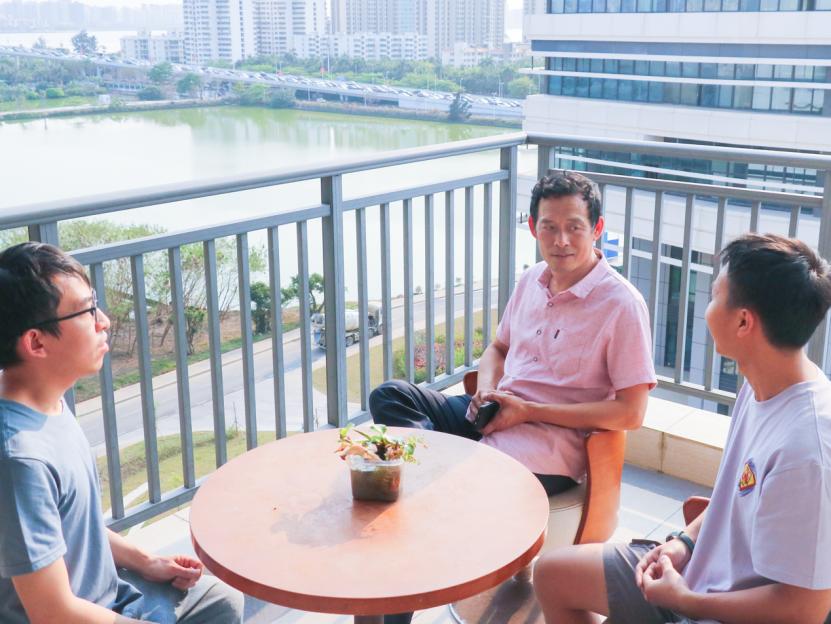
高树基与学生交谈。
Shu-Ji Kao was talking with students.
“高老师特别有趣,别看他今年57岁了,我们年轻人喜欢玩梗他也喜欢呢。”高树基课题组的一位学生眉飞色舞地说道。
“Although Professor Kao is 57 now, he likes modern humor as well.” One student from his research team spoke vividly.
说到高老师玩梗,本篇采访标题的“玩氮”就来自高树基在采访时的分享。
Kao is very humorous and has many funny memes.
他开玩笑道:“我现在不就在研究氮循环嘛,再加上现在年轻人不都喜欢玩谐音梗,‘玩氮’谐音‘完蛋’,这样的标题足够震惊,是不是可以吸引更多人看呢?”
He jested, “Young people nowadays like puns. I am now engrossed in the study of nitrogen cycling, and ‘playing with nitrogen’ in the Chinese title sounds like ‘game over’ in Chinese pronunciation, which can attract more Chinese readers to read this tweet.”
为人梯不易,甘为人梯更难。在高树基课题组师生印象里“高老师的讲座干货特别多,少有能难倒他的问题。因为他是一个恨不得把他懂的全部灌给你的人”;“刚进组的时候,高老师让我们一定要找到自己的兴趣点,然后他会全力支持我们的发展方向”;“在高老师的鼓励下,我们沿着自己的喜好与强项来发展,因此整个课题组的研究方向都大不相同。高老师虽然在教,但他总说教学相长,也许正因为这样,他的研究领域在不停地拓宽吧”;“高老师对我这样刚入职的小透明老师也很关照,开会的时候还会跟我们问好”……
Contributing oneself to help others is difficult, but doing so willingly and with joy is even more so. His lectures provide numerous insightful points, and there are seldom any issues that can stump him due to his sound preparation and commitment to sharing his knowledge with others. “When we first joined the group, Professor Kao insisted that we should find our own points of interest, and he would fully support our choices.” “Encouraged by him, we are able to develop our own interests and strengths, which results in a very diverse research interests for our team. He often says that teaching and learning can complement each other, which is why his research field can continue to expand.” “Professor Kao also takes good care of us newcomers. He always greets us during meetings.”
高树基与我国许多优秀科学家一样,既是科研事业开拓者,又是奖掖后进的领路人。只有薪火相传才能拾级而上、登高望远,为建设科技强国提供强大的后备军和新生力量,推动科技进步和国家发展。
Like many outstanding scientists in China, Kao is both a pioneer in scientific research and a leader in nurturing the next generation. Only by continuously cultivating capable successors while making contributions can we drive the development of technology and our whole country.
(本文特别鸣谢高树基课题组全体师生对采访的支持与帮助。)
(Special thanks to the teachers and students in Shuh-Ji Kao’s group for facilitating this interview)
文字/杨婕 梁现战 郑润泽
Chinese Writers/ Jie Yang, Xianzhan Liang,Runze Zheng
摄影/万睿志 杨婕
Photographors/ Ruizhi Wan, Jie Yang
 公众号
公众号